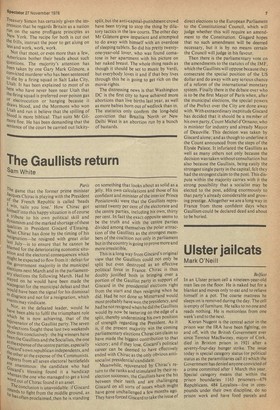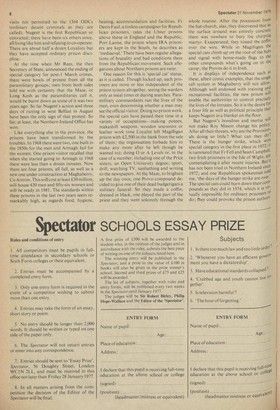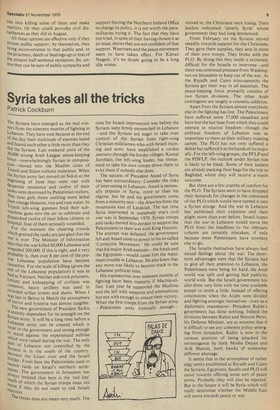Ulster jailcats
Mark O'Neill
Belfast In an Ulster prison cell a nineteen-year-old man lies on the floor. He is naked but for a blanket and moves only to eat and to relieve himself in a pot. The coarse mattress he sleeps on is removed during the day. The cell is empty of furniture. He talks to no one and reads nothing. He is motionless from one week's end to the next.
Kieran Nugent is the central actor in the prison war the IRA have been fighting, on and off, with the British Government ever since Terence MacSwiney, mayor of Cork, died in Brixton prison in 1921 after a seventy-four-day hunger strike. The issue today is special category status (or political status as the paramilitaries call it) which the Government has denied anyone convicted of a crime committed after I March this year. Special category means that within the prison boundaries 1163 prisoners-679 Republicans, 484 Loyalists—live in compounds under their own discipline, do no prison work and have food parcels and
visits not permitted to the 1364 ODCs (ordinary decent criminals as they are called). Nugent is the first Republican so convicted; there have been six others since, all living like him and refusing to co-operate. There are about half a dozen Loyalists but they have accepted ordinary prison discipline.
At the time when Mr Rees, the then Secretary of State, announced the ending of special category for post-I March crimes, there were howls of protest from all the paramilitary groups; men from both sides told me with certainty that the Maze, or Long Kesh as the paramilitaries call it, would be burnt down as some of it was two years ago. So far Nugent's action and three days of rioting in west Belfast in August have been the only sign of that protest. So far, at least, the Northern Ireland Office has won.
Like everything else in the province, the prisons have been transformed by the troubles. In 1968 there were two, one built in the 1850s for the men and Armagh Jail for the women. One prison visitor recalled that when she started going to Armagh in 1968 there were less than a dozen inmates. Now there are four prisons, all full, as well as a new one under construction at Maghaberry, Co Antrim. This will cost at least £30 million, will house 430 men and fifty-six women and will be ready in 1981. The standards within these prisons in the last two years seem remarkably high, as regards food, hygiene, heating, accommodation and facilities. Fr Denis Faul, a tireless campaigner for Republican prisoners, rates the Ulster prisons above those in England and the Republic. Port Laoise, the prison where IRA prisoners are kept in the South, he describes as 'mediaeval.' There have been regular allegations of brutality and bad conditions there from the Republican movement. Such allegations about Northern prisons are rarer.
One reason for this is 'special cat' status, as it is called. Though locked up, such prisoners are more or less independent of the prison system altogether, seeing the warders only at meal times or during searches. Paramilitary commandants run the lives of the men, even determining whether a man may see the official visitor. Doing no prison work, the special cats have passed their time in a variety of occupations—making poteen, makeshift weapons, wooden souvenirs or leather work (one Loyalist left Magilligan prison with 0,500 in the bank from the sale of them; the organisation forbade him to make any more after he left though he wanted to); doing 0 or A Levels or, in the case of a number, including one of the Price sisters, an Open University degree; sport, drill, watching TV, sunbathing and writing to the newspapers. At the Maze, to brighten up the day once, one Provo compound decided to give one of their dead budgerigars a military funeral. So they made a coffin, dressed in black, one played the part of the priest and they went solemnly through the whole routine. After the procession front the hut-church, alas, they discovered that as the surface around was entirely concrete there was nowhere to bury the chirping martyr. Exasperated, they tossed the coffin over the wire. While in Magilligan the special cats climb up on the rool of the huts and signal with home-made flags to the other compounds what's going on in the camp; the Provos dolt in Irish.
It is displays of independence such as these, albeit comic examples, that the single cell system in Maghaberry will not allow. Although well endowed with training and recreational facilities, the new prison enable the authorities to control preciselY the lives of the inmates. So it is the desire for a freer life as well as political principle that keeps Nugent in a blanket on the floor.
But Nugent's boredom and inertia not make Roy Mason change his policy.
After all their threats, why are the Provisionals doing so little? What can they do?
There is the hunger strike, which we.° special category in the first place in 1972; it is rumoured that Fr Fell and Sean Campbell, two Irish prisoners in the Isle of Wight, are contemplating it after recent injuries. But it has not been tried in Northern Ireland since 1972; and one Republican spokesman told, me, 'the days of the hunger strike are over. The special cats could burn down their corn' pounds as they did in 1974, which it is virtually impossible for ordinary prisoners t.° do; they could provoke the prison author!.
ties into killing some of them and make martyrs. Or they could provoke civil disturbances as they did in August.
All these options are effective only if they arouse public support; by themselves, they bring inconvenience to that public and, to the prisoners, death or beatings-up or loss of the present half-sentence remission. So, unless they can be sure of public sympathy and support forcing the Northern Ireland Office to change its policy, it is not worth the paramilitaries trying it. The fact that they have not tried, in spite of their having chosen it as an issue, shows they are not confident of that support. Weariness and the peace movement seem to have taken effect. For Kieran Nugent, it's no doubt going to be a long idle winter.












































 Previous page
Previous page